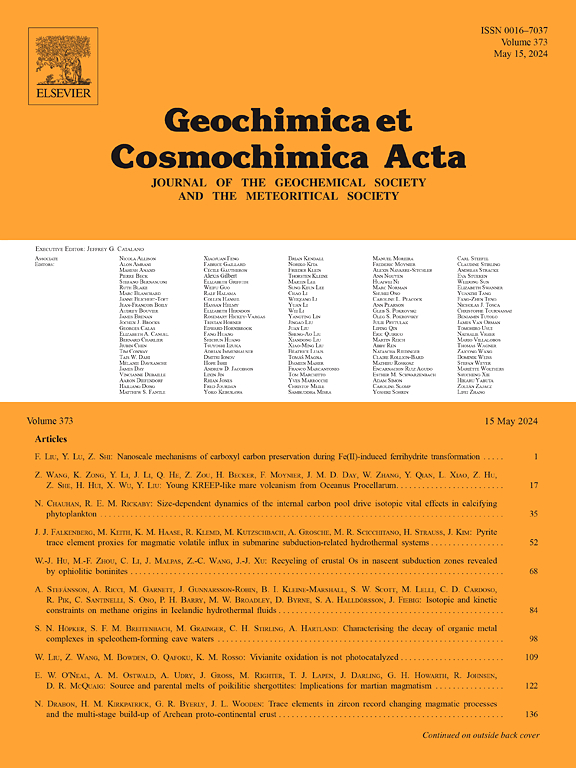Substrate chemistry trumps mineral protection in governing temperature sensitivity of organic carbon mineralization in saline lake sediments
IF 5
1区 地球科学
Q1 GEOCHEMISTRY & GEOPHYSICS
引用次数: 0
Abstract
Organic carbon sequestered in lake sediments represents a crucial but vulnerable reservoir within the global carbon cycle. However, the temperature sensitivity of organic carbon mineralization in saline and alkaline lake sediments, particularly under global warming, remains poorly understood. This study addresses this knowledge gap by employing microcosm incubation, coupled with absorption spectroscopy, and matrix-assisted laser desorption/ionization time-of-flight mass spectrometry, to investigate the temperature-dependent mineralization dynamics of organic carbon in saline lake sediments sourced from the Qinghai-Tibet Plateau. The results revealed that, although lake sediments are rich in mineral−bound organic carbon, the stability of organic carbon under warming conditions is primarily governed by substrate concentration and molecular composition, rather than mineral protection. Specifically, increases in organic carbon concentration and the proportion of labile organic matter significantly enhance mineralization activity and its temperature sensitivity (Q10), thereby accelerating the turnover of sedimentary organic carbon pools, and challenging the classical Carbon Quality-Temperature (CQT) hypothesis. Moreover, dissolved and insoluble organic carbon pools exhibited comparable temperature response patterns, together contributing to the accumulation of recalcitrant organic carbon at high temperature conditions. This study systematically disentangles the relative contributions of substrate properties and mineral protection to organic carbon stability and elucidates temperature-driven shifts in sediment carbon pools. These findings provide critical insights into the vulnerability and future trajectory of lake sediment organic carbon reservoirs under climate warming scenarios.
在控制盐湖沉积物中有机碳矿化的温度敏感性方面,基质化学优于矿物保护
湖泊沉积物中的有机碳是全球碳循环中一个至关重要但脆弱的储存库。然而,盐湖和碱性湖泊沉积物中有机碳矿化的温度敏感性,特别是在全球变暖的情况下,仍然知之甚少。结果表明,虽然湖泊沉积物中富含矿物结合有机碳,但有机碳在升温条件下的稳定性主要受底物浓度和分子组成的影响,而不是受矿物保护的影响。具体而言,有机碳浓度和活性有机质比例的增加显著增强了矿化活动及其温度敏感性(Q10),从而加速了沉积有机碳库的周转,挑战了经典的碳质量-温度(CQT)假说。此外,可溶性和不溶性有机碳库表现出相似的温度响应模式,共同促进了高温条件下顽固性有机碳的积累。本研究系统地解开了基质性质和矿物保护对有机碳稳定性的相对贡献,并阐明了沉积物碳库的温度驱动变化。这些发现为气候变暖情景下湖泊沉积物有机碳库的脆弱性和未来轨迹提供了重要见解。
本文章由计算机程序翻译,如有差异,请以英文原文为准。
求助全文
约1分钟内获得全文
求助全文
来源期刊

Geochimica et Cosmochimica Acta
地学-地球化学与地球物理
CiteScore
9.60
自引率
14.00%
发文量
437
审稿时长
6 months
期刊介绍:
Geochimica et Cosmochimica Acta publishes research papers in a wide range of subjects in terrestrial geochemistry, meteoritics, and planetary geochemistry. The scope of the journal includes:
1). Physical chemistry of gases, aqueous solutions, glasses, and crystalline solids
2). Igneous and metamorphic petrology
3). Chemical processes in the atmosphere, hydrosphere, biosphere, and lithosphere of the Earth
4). Organic geochemistry
5). Isotope geochemistry
6). Meteoritics and meteorite impacts
7). Lunar science; and
8). Planetary geochemistry.
 求助内容:
求助内容: 应助结果提醒方式:
应助结果提醒方式:


